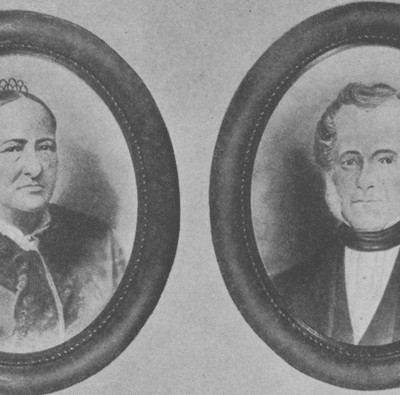
Abraham May (d.1862) was a farmer and cattle dealer in Ebelsbach, a small town in northern Bavaria, in present-day Germany. He and his wife, Rosa Silverman May, had nine children, Fannie, Babette, Simon, Baruch, Jennie, Yetta, Samuel and two children who died in infancy.
As a young boy, Baruch “Barney” May (1843-1921) was responsible for bringing bread, cheese and beer to the men working the fields, several miles from the town. He later joined them in the fields and also helped his father with the cattle trade. In 1858, May and his older sister Babette immigrated to Montreal via New York City to join their sister Fannie and her husband, Isidore Sampson, who had opened a jewelry store. With only a few phrases of English, Barney started peddling trinkets in the towns west of Montreal and later in Newfoundland. With his brother Simon, he followed the gold rush to British Columbia, which in the days before the transcontinental railroad required a trip through the Panama Canal. “Being wise in their generation, the Mays attempted no actual mining operations themselves, but preferred to develop the claims, to which they held title, on a share basis with practical miners,” George M. P. Baird wrote in The Story of Barney May, Pioneer in 1917. They stayed in British Columbia for four years, until a “mountain fever” outbreak forced them to seek medical attention in San Francisco.
After his recovery, May traveled to New York City, where his sisters Fannie and Yetta had opened a millinery shop. Business was slow, so the siblings sold their stock and moved to Williamsport, Pa., where May started a millinery and dry goods store with William Silverman.
Yetta May married Jacob Morganstern and moved to Pittsburgh. There, she befriended Pauline Fleischman and arranged a match with her brother. In 1872, May and Fleischman were married by Dr. Lippman Mayer of Rodef Shalom Congregation. Barney and Pauline May moved to Philadelphia, where Simon May owned a wholesaling business. Although successful, the business was essentially destroyed in an 1884 fire. Having seen Western Pennsylvania at the height of the oil boom as a traveling salesman, Barney May moved to Pittsburgh.
He opened a dry goods store, which went out of business during the Panic of 1893. On the advice of an acquaintance from New York, he decided to sell patent remedies, which were an early form of pharmaceuticals. Borrowing money from friends, he started a business on Market Street, downtown, in 1894. He operated entirely on cash — no credit — and offered money back guarantees, which were rare in retailing at the time. In time, the May Drug Company became one of the most successful drug companies in Pittsburgh with May managing a series of branches from its headquarters at the May Building, which still stands at the corner of Liberty and Fifth Avenues.
Barney and Pauline May had four children, Herbert, Walter, Edwin and Estelle, all of whom worked in the family company in various capacities. The family sold the company to the Liggett Drug Company in 1929.
Walter May (1874-1943) went to primary schools in Philadelphia and Pittsburgh. He earned an engineering degree from Cornell University in 1894 and practiced the profession for a time before joining the May Drug Company about 1900. He became president of the company in 1921, when his father died, and stayed in that position until 1929, when the business was sold. In April 1903, Walter May married Mollie Brilles (1873-1950) at the Concordia Club. In April 1928, for their silver anniversary, they took 63 people, many of them guests at their wedding, on an all-expenses-paid trip to Paris. Among the guests were Max Blum, Eleanor Benswanger and Horace and Antoinette Gallinger. The excursion made headlines around the world.
Herbert and Edwin May both married sisters of Mollie Brilles.
Walter May was a trustee of the Associated Charities of Pittsburgh, a founder of the Urban League and a trustee of the Federation of Jewish Philanthropies, among other charitable works.